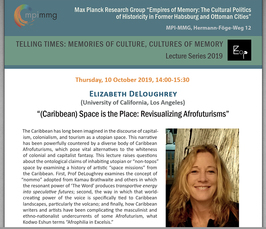"(Caribbean) Space is the Place: Revisualizing Afrofuturisms"
Telling Times: Memories of Culture, Cultures of Memory - Lecture Series 2019
- Date: Oct 10, 2019
- Time: 02:00 PM - 03:30 PM (Local Time Germany)
- Speaker: Elizabeth DeLoughrey (University of California, Los Angeles)
- Elizabeth DeLoughrey is a Professor in English and at the Institute for the Environment and Sustainability at the University of California, Los Angeles. She is co-editor of Caribbean Literature and the Environment (U of Virginia Press, 2005), Postcolonial Ecologies: Literatures of the Environment (Oxford University Press, 2011), and Global Ecologies and the Environmental Humanities: Postcolonial Approaches (Routledge, 2015). She is the author of Routes and Roots: Navigating Caribbean and Pacific Island Literatures (University of Hawai`i Press, 2007), and a recent book about climate change and the literary and visual arts entitled Allegories of the Anthropocene (Duke UP, 2019). With Thom Van Dooren, she is co-editor of the international, open-access journal Environmental Humanities.
- Location: MPI-MMG, Hermann-Föge-Weg 12, Göttingen
- Room: Conference Room

For more details please contact cziesielsky(at)mmg.mpg.de.
The Caribbean has long been imagined in the discourse of capitalism, colonialism, and tourism as a utopian space. This narrative has been powerfully countered by a diverse body of Caribbean Afrofuturisms, which pose vital alternatives to the whiteness of colonial and capitalist fantasy. This lecture raises questions about the ontological claims of inhabiting utopian or “non-topos” space by examining a history of artistic “space missions” from the Caribbean. First, Prof DeLoughrey examines the concept of “nommo” adopted from Kamau Brathwaite and others in which the resonant power of ‘The Word’ produces transportive energy into speculative futures; second, the way in which that world-creating power of the voice is specifically tied to Caribbean landscapes, particularly the volcano; and finally, how Caribbean writers and artists have been complicating the masculinist and ethno-nationalist undercurrents of some Afrofuturism, what Kodwo Eshun terms “Afrophilia in Excelsis.”